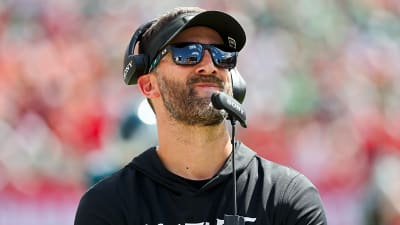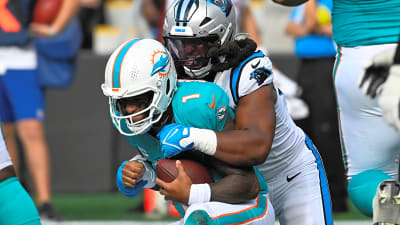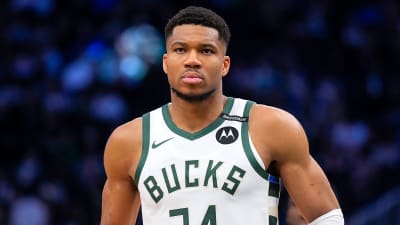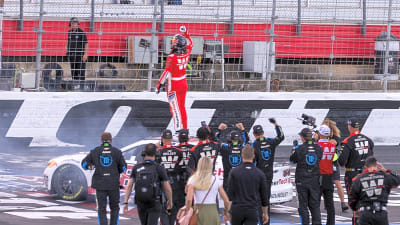
That’s how it ended?
That’s how it ended?
Yep.
The Philadelphia Phillies won 96 games in 2025. They scored 778 runs and gave up 648. They improved their win-loss record and their run differential for a fifth year in a row. It was a good year.
The superstar trio of Kyle Schwarber, Trea Turner, and Bryce Harper led the offense. Schwarber was the NL home run king. Turner was the batting champ. Harper hit his 350th homer, stole his 150th base, and drove in his 1,000th run, continuing to build the case that will one day land him in Cooperstown with a Phillies logo on his cap.
Of course, once again, it was the pitchers, and specifically the starters, who really led the way for this club. Phillies starters had the highest strikeout rate, the second-lowest walk rate, and the third-best home run rate in the majors, all while leading the league in innings pitched.
They finished with 21.5 FanGraphs WAR, 5.4 wins ahead of the Reds in second place. They could have given all 32 of Jesús Luzardo‘s starts (in which he compiled 5.3 fWAR) to just about anyone, and they still would have had the best rotation in baseball.
And the fact that they accomplished all that despite significant injuries to Aaron Nola and Zack Wheeler – two pitchers whose consistent presence atop the rotation was critical to the team’s success in each of the three years prior – only makes it more impressive. Cristopher Sánchez, Ranger Suárez, and Luzardo all stepped up in a major way.
Like I said, it was a good year.
Until it wasn’t.
On Thursday night, the Phillies’ season ended in scream-at-your-TV, flip-the-coffee-table, tear-out-your-hair fashion. In the 11th inning of a 1-1 game, Orion Kerkering let a physical mistake lead to a mental one, giving the Dodgers the game-winning run on what should have been the final out of the frame.
With two outs and the bases loaded, Kerkering bobbled a dribbler to the mound. When he finally picked it up, instead of making the easy throw to first base, he went home instead. Or at least he tried to. All J.T. Realmuto could do was make a desperate leap for a ball he was never going to catch as Hyeseong Kim ran past to end the ballgame, the series, and the Phillies’ season.
Frustrating doesn’t even begin to describe it.
And yet, like I said (and like I said again), it was a good year.
The Phillies won the NL East and finished with the second-best record in baseball for a second year in a row. They won 96 games for the first time in 14 years and the sixth time in franchise history.
By and large, Dave Dombrowski’s offseason add-ons and trade deadline pickups made the team better, giving an aging core another great opportunity to contend for a title.
Sometimes, you just lose.
This was not a fun series. Disappointment is the only word to describe it.
But then again, if just a few small things went slightly differently, we could easily be celebrating a Phillies trip to the NLCS instead.
What if Harrison Bader didn’t injure his groin in Game 1? What if Rob Thomson didn’t have Bryson Stott bunt in the ninth inning of Game 2? What if Kerkering threw to first in Game 4? What if the home plate umpires didn’t favor the Dodgers in all four games of the series (per Umpire Scorecards) for a cumulative advantage of +1.85 runs?
After all, the Phillies outscored the Dodgers 15-13. They struck out less, walked more, and had twice as many extra-base hits. They stole more bases, made fewer errors, hit the ball harder, and grounded into fewer double plays. In many ways, they were the better team.
I’m not trying to make excuses. None of that other stuff matters when you don’t win the games, and nothing I said makes the Phillies’ early exit hurt any less.
My point, however, is that nothing we witnessed in the NLDS was a sign of a serious organizational failure. It’s barely been a week since more than one-third of our staff picked the Phillies to win the World Series. No other team earned nearly as many votes.
Four games later, and the Phillies’ World Series odds are down to 0.0%. But that shouldn’t change anyone’s opinion about the talent on this roster.
The Phillies weren’t just a good team in 2025. They were one of the best. Arguably the best.
More importantly, the 2025 Phillies were better than the 2024 Phillies, who were better than the 2023 and 2022 and 2021 and 2020 Phillies. They were better on both sides of the ball. How can you call that anything other than progress?
Certainly, the Phillies have questions to answer and issues to address.
It’s fair to worry about an aging Harper, Turner, Wheeler, and Nola in 2026 and beyond. It’s fair to worry about Schwarber, Suárez, Realmuto, and Bader leaving in free agency. Every other team in the NL East will be looking to improve this winter. They’ll want to make things harder for the Phillies in 2026.
In that light, it’s hard not to see Philadelphia’s quick elimination as a missed opportunity. And it was! But that’s only true because of all the ways the Phillies succeeded in order to reach the point where failure caught up to them.
That’s how it ended? Yes, that’s how it ended.
But everything that came before the end? That was all pretty great.
More must-reads:
- Three areas for Atlanta Braves to focus on during offseason
- Rob Thomson makes another costly decision during NLDS Game 4
- The 'MLB playoff debut strikeouts leaders' quiz
Breaking News
Trending News
Customize Your Newsletter
 +
+
Get the latest news and rumors, customized to your favorite sports and teams. Emailed daily. Always free!








